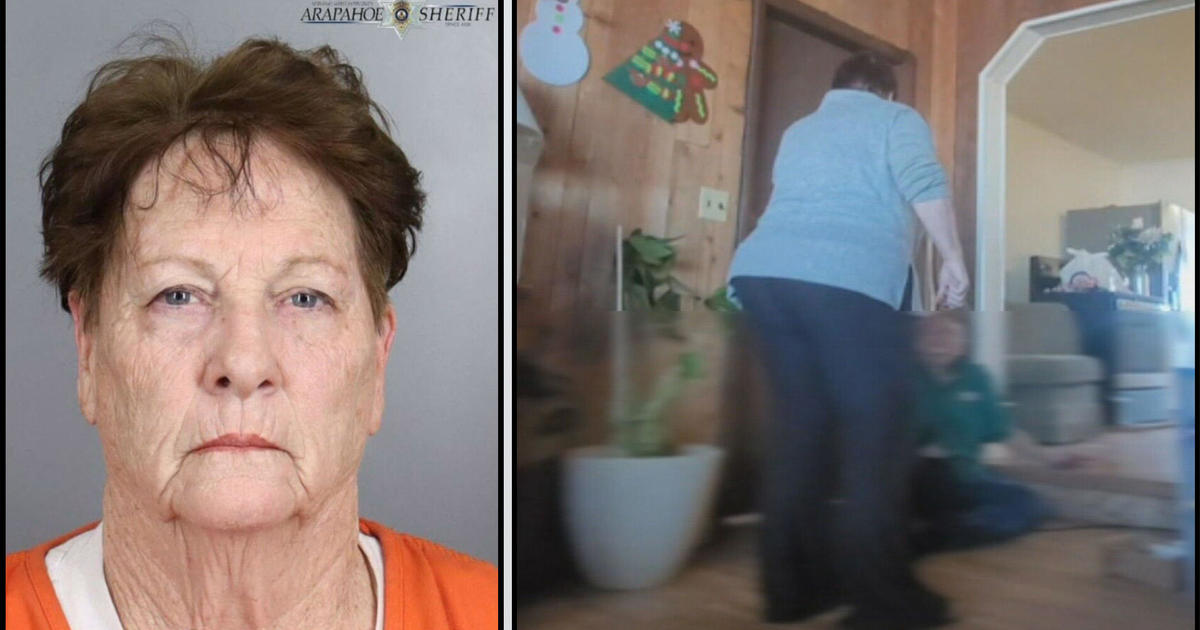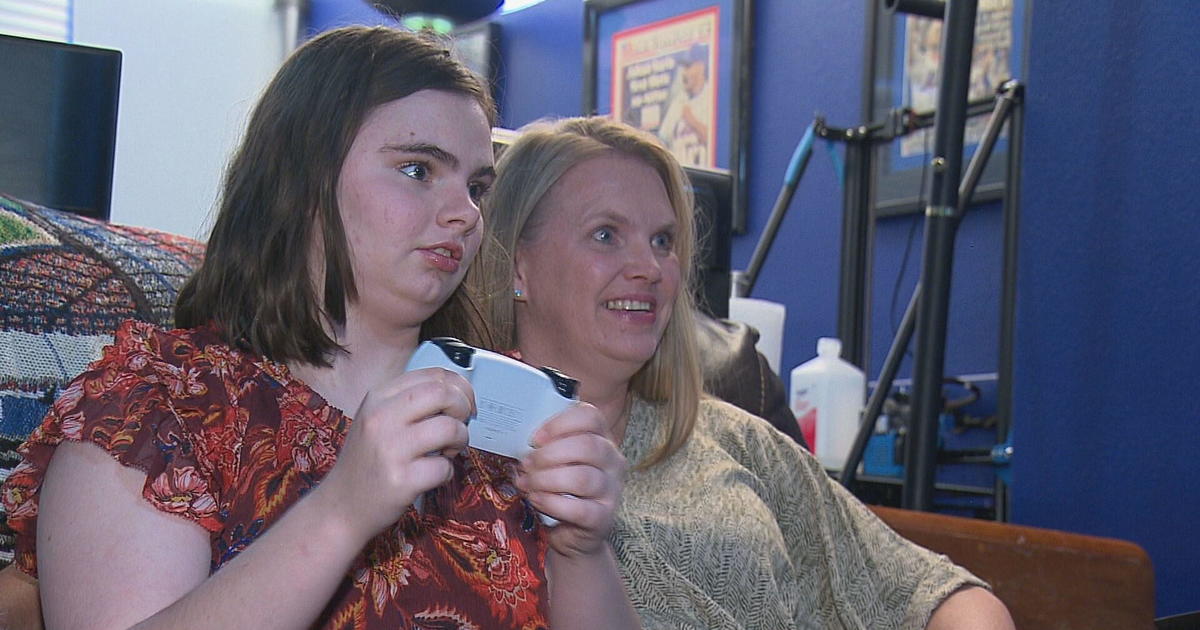CSU Program Pairs Disabled Students With Mentors
FORT COLLINS, Colo. (AP) - Following a Nov. 17, 2010, car wreck on Colorado Highway 86, doctors drilled a hole into then 19-year-old Hailey Misheff's skull and induced a medical coma to reduce swelling in her brain. She remembered "nothing" upon waking; her first memory thereafter is from Christmas 2010.
When she could swallow again, the Elizabeth resident was admitted to Craig Hospital where she began intensive, in-house rehabilitation through January. She practiced over and over how to correctly swallow without fluids traveling down her ear tube; she played games to combat the injury to her left frontal lobe and strengthen her memory and reflexes; and in her weakened state, she practiced the "very difficult" task of walking.
Add to that other forms of occupational, physical and speech therapy treatments with the hospital's out-patient program that continued for months.
Was recovery difficult?
"You have no idea," she told the Coloradoan. It's not behind her, either.
"Really, it's recovering educationally and memory wise," said Misheff, now 21.
During her time at Craig Hospital, Misheff saw people "who were successful and not," following traumatic brain injuries. At that time, she didn't think she would be able to go to school; that she would have to live with and depend on her parents her "whole life."
"And that scared the life out of me," she said.
"I thought I was going to be working at Target or some low-income level job for the rest of my life," the aspiring journalist said.
But all that's changed since she stepped foot on Colorado State University's campus as a student in fall 2011. Now, she feels empowered to finish school and achieve her career dream - to work in public relations for the Colorado Rockies.
In telling her tale, Misheff attributes much of her success to a program called Opportunities for Postsecondary Success, or OPS.
OPS is under the auspices of the Center for Community Partnerships, in CSU's Department of Occupational Therapy.
Once a student from CSU or Front Range Community College has applied and is admitted to the program, they are paired with a mentor. Those who qualify for services are typically on the autism spectrum, have brain injuries - either those they were born with or suffered later in life - or other conditions such as Asperger syndrome.
Taking a "holistic approach," mentors help mentees through their experience in school "above and beyond" academics, said Julia Kothe, assistant director of the university's Center for Community Partnerships.
While this could mean teaching a student more-effective study skills or where to find tutoring resources on campus, guidance could also include stress management, how to make friends and share personal challenges/successes and "self-advocacy," Kothe said.
"All" new students admitted to CSU face challenges, Kothe said. But those with disabilities - especially those who "have had even more of those supports in place" prior to starting college - can face taller hurdles.
Kothe gave an example: One student on the autism spectrum always completed the assigned homework. Because of the way he communicated, however, he never turned assignments in - and was failing - because the professor didn't explicitly ask students to do so. The situation was made better after the student talked with the professor.
In that case, it was about teaching the student to advocate for his needs and helping people like him to "not fall through the cracks," Kothe said.
Having studied at Community College of Denver prior to the car crash, Misheff described walking onto CSU's campus for the first time as "terrifying, absolutely terrifying."
Then a counselor in CSU's Resources for Disabled Students turned Misheff onto OPS where she was "lucky enough to have the most amazing" mentor in Stassie El-Sayad. The first few months, El-Sayad and Misheff met two or three times a week to practice, among many topics, memorization and study techniques - things that came easily to Misheff before her injury.
Over time, they met less and less often until Misheff just texted El-Sayad when she needed to talk or was looking for direction.
"That's how much she helped me grow," Misheff said.
Occupational therapist Sarah Beetch lauded Misheff's progress and called her "an incredible advocate" for herself and now other members of CSU's newly formed Brain Injury Support Group. The group intends to spread awareness about brain injury and support people who have suffered an injury or whom know someone who has.
The experience is similar for others.
On a warm fall afternoon last week, graduate student Onalee Baumgartner helped sophomore math major Nathaniel Karasik set alerts on his cellphone to remind him of upcoming assignments and exams. The two sat on a wooden picnic table outside the Occupational Therapy building, a thick binder with Karasik's class schedule, syllabuses and progress reports set open before them.
In addition to the calendar alerts, evening texts from Baumgartner early this and next week would coax Karasik to sketch the moon for his astronomy class.
In his second year with OPS, Karasik meets with Baumgartner once a week to discuss organization, studying and academic goals. Karasik has ADHD and Asperger syndrome - he has his "entire life" -which together makes it "kind of hard to concentrate," he said, seated and bouncing on a blue exercise ball during his interview in the Occupational Therapy building.
"As a kid, you jump up and down, no one gives a crap," he said, grinning before taking a bite out of one of several carrots in his hand.
As an older person, though, it's different, harder to explain. But he's glad to have been a part of OPS.
"I learned, once I got here, that they'd help keep me on track with homework and studying," said Karasik, who's working with Baumgartner to boost his GPA and switch from majoring in math to something involving numbers and business. Accounting, perhaps.
Students on the autism spectrum haven't always been "encouraged to pursue college," Kothe said. That's where "unique" programs, such as OPS, come in.
OPS started with grant funding in October 2010; students who don't qualify for scholarships pay a fee for service. In its third year, the program each semester can accommodate between 33 and 35 students - Kothe estimates about 65 percent are on the autism spectrum, 30 percent have brain injuries and the other 5 percent have diagnoses including ADHD or Asperger syndrome.
And the program is growing.
"What we have found, as word gets out, is that more students are referred to the program," Kothe said, adding that out-of-state parents are calling to get their students into OPS, for which there's "usually" a waiting list.
Incidence of brain injury is "highest" among college-age students, Kothe said, who get into motor vehicle and sporting accidents most frequently. As this and the population of autistic students increases, so too has "need driving the program."
That's why, even after grant funding runs dry in October 2015, Kothe wants to keep OPS "going" and "stronger" than ever before.
"I think CSU wants to be a campus that welcomes diversity," she said. "And this includes students with disabilities."
- By MADELINE NOVEY, The Coloradoan
(© Copyright 2012 The Associated Press. All Rights Reserved. This material may not be published, broadcast, rewritten or redistributed.)



